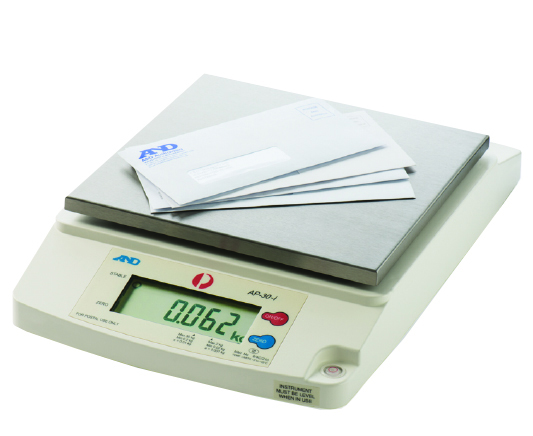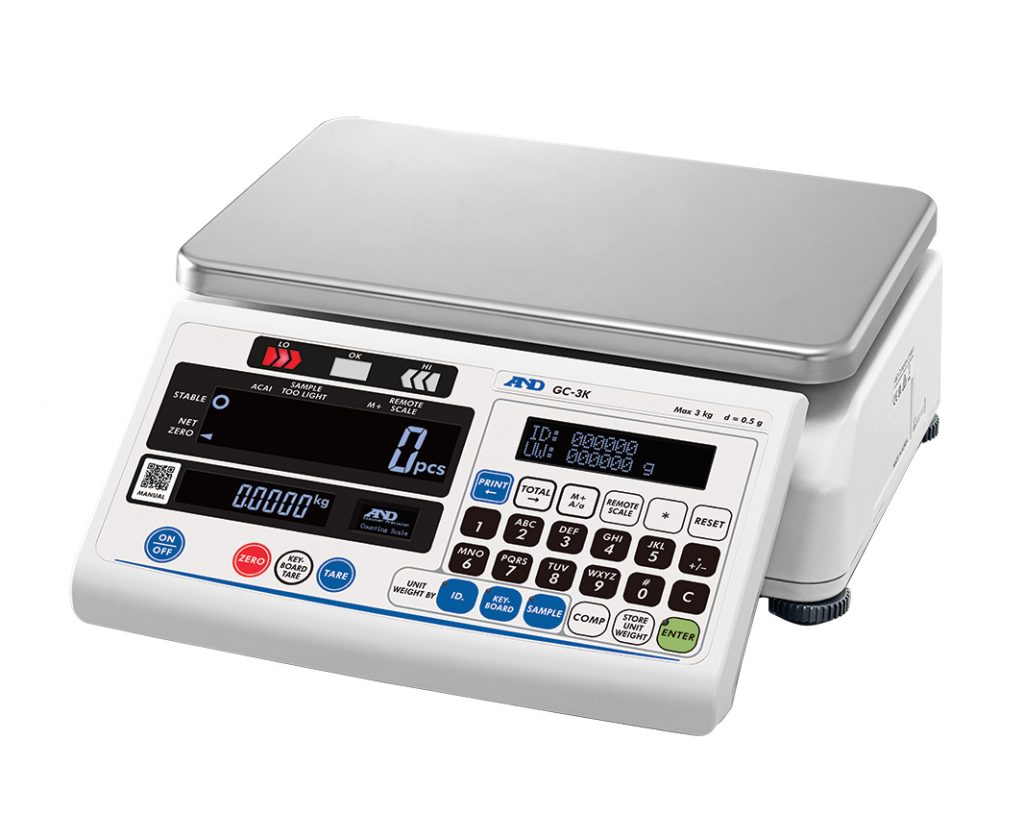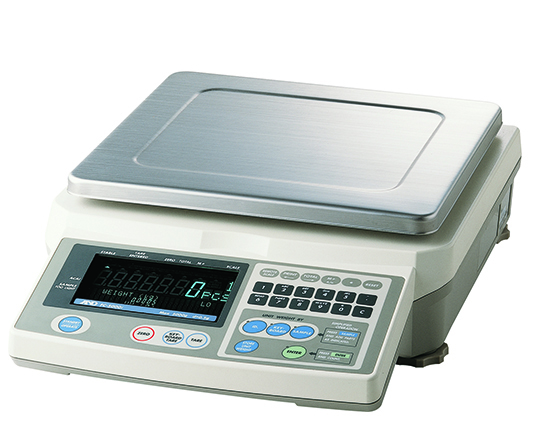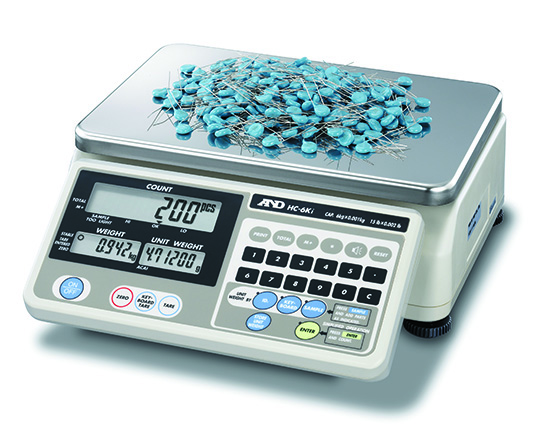
A&D’s postal mail scales are produced specifically for precise letter and parcel weighing. With AC operation, the AP-30i postal scale interfaces directly with Australia Post’s EPOS System. Approved for Australia Post LPOs and fully supported and serviced by A&D Weighing, this electronic postal scale is sure to improve your mailing efficiency.

Featuring A&D’s uniquely innovative solutions, the GC series of counting scales let you spend much less time and effort on setup and preparation so that you can start counting right away.

Top of the range counting scale featuring 500 ID memories, count accuracy, standard RS232 interface and second platform facility. Counting scale capacities range from 500g to 50kg. The FC500Si and FC 5000Si scales have a count accuracy of 1 in 10,000,000.

Faster and accurate counting. Fantastic value counting scale featuring 1 in 750,000 count accuracy, easy operation, 99 ID memories, rechargable battery, detachable display and audible weighing assist (AWA). Counting scale capacities of 3kg, 6kg, 15kg and 30kg are available.
Counting scales are an essential tool for any business dealing with items that need to be counted. These scales can measure the weight and count of different products quickly and accurately, allowing businesses to keep track of their inventory more effectively. They feature a digital display that can show an exact or estimated count quickly and accurately. Counting scales come in a variety of shapes, sizes, and models, making them suitable for a range of applications. These are used in a variety of industries including manufacturing, retail stores, pharmacies, financial institutions, office buildings and warehouses. We have a guide on counting scales, you can read it there at blog page.
How Does a Counting Scale Work?
Counting scales work by first determining the weight of an item. The scale will then calculate how many items are present on the platform based on the average weight entered by the user. This allows for a much more accurate count than simply counting items manually, which can be time-consuming and prone to error. Some counting scales also offer features like Check Weighing, Count Accuracy Adjustment (CAA) or advanced memory functions to store data from multiple weightings. This advanced functionality helps with accuracy and efficiency when it comes to weighing and counting larger quantities of products.
Additionally, many counting scales have built-in communication software that allows them to send data directly into a computer system via USB or other digital interfaces for faster inventory tracking and easier management of stock levels.
Calibration Process of a Counting Scale
The calibration process of a counting scale is an important part of ensuring accurate readings. In general, the count scale should be calibrated before each use to ensure accurate results. The principles behind the calibration process are based on the basic concepts of measuring mass and volume.
Step 1:
First, the count scale must be set for a known mass or volume, which will serve as a reference point for the calibration. This reference point must be within the desired accuracy range and should not shift during the measurements. Generally, this reference point is provided by a weight or volume standard certified by an accredited laboratory. For legal-for-trade scales, certifications from NIST traceable companies are required.
Step 2:
Once the reference point has been established, it can then be used as a basis for calibrating other points on the scale. To complete this task, either a known weight or known volume must be placed on top of the scale and allowed to rest until all movement ceases. Once it has settled into position, its value can then be recorded and compared against the reference point to determine if any adjustment is needed to maintain accuracy. Depending on how easily adjustable your particular model is, you may need to add or remove weights/volumes in order to refine its accuracy level in between measurements.
By following these steps and regularly calibrating your count scale with acceptable weights and volumes you can ensure that your measurements remain consistent and reliable over time.
Best Tips for Choosing the Right Counting Scales for Businesses
Choosing the right counting scale for businesses can be a daunting task. Businesses need to make sure that the counting scale they select will accurately and efficiently measure their products, while also meeting their budget constraints. To ensure that businesses purchase the most suitable counting scale for their needs, here are some of the best tips to consider:
1. Understand Your Needs:
Before selecting a counting scale, it is important to understand your business’s requirements and needs. Many scales have different capabilities and features; thus, understanding which specific features you require from your scale is essential in order to pick one that will meet your expectations.
2. Analyse Accuracy:
It is important to analyse accuracy when purchasing any type of weighing device; this is especially true when it comes to counting scales as accuracy plays a significant role in calculating how much money you are making or losing with each transaction. Make sure you research the accuracy rating of any counting scale you are considering before making a purchase.
3. Read Reviews & Testimonials:
Doing research on reviews and testimonials from past customers gives insight into how effective and reliable different counting scales may be for businesses like yours. Reading about other people’s experiences can help sway decisions about which type of counting scale would be best suited for your business’s needs.
4. Consider Maintenance & Support:
Be sure to consider maintenance and support when selecting a counting scale for your business; if something happens that requires upkeep or repair work, then having easy access to assistance can save you time and money in the long run. Additionally, many companies offer warranties on their products so you should take advantage if available!
5. Think About Mobility:
Depending on how much usage the machine is expected to receive, mobility may be an important factor when purchasing a counting scale; if portable models are more suitable for your business, then keep these options in mind when shopping around!
By following these tips, businesses can confidently choose the best counting scale for their unique needs while staying within their budget limits!
FAQs About Counting Scales
How accurate are counting scales?
Counting scales are a type of weighing scale designed to count the exact number of items present in a given sample. They are often used in logistics, production, and inventory control for counting small parts, coins, or other objects. Counting scales are typically accurate up to two decimal places, making them more accurate than traditional weighing scales.
What is the capacity of a counting scale?
A counting scale is a type of digital scale that is specifically designed to provide an accurate count of a certain number of items. It works by measuring the combined weight of multiple individual items that have been placed on the scale. This makes it useful for quickly and accurately counting large quantities of similar items.
Does the counting scale come with a warranty?
The counting scale does come with a warranty, typically lasting one year from the time of purchase. The warranty covers any defects in the materials or workmanship of the product, and guarantees that the product will remain free from such defects for the duration of the warranty period.
Is the counting scale easy to use and set up?
The counting scale is incredibly easy to use and set up, making it a great choice for businesses or individuals who need accurate counting of items. The scales are designed for quick and simple operation, typically requiring only a few button presses to begin counting.
Does a counting scale need to be calibrated regularly?
Yes, counting scales need to be calibrated regularly to ensure accuracy and precision. Every scale should be re-calibrated at least one a year to maintain its level of accuracy. In addition, all scales should be checked for accuracy before each use. This checking is important as environmental conditions can affect the readings, such as temperature changes or air pressure shifts.
What is the resolution of a counting scale?
The resolution of a counting scale is the smallest measurement it can detect. This is usually expressed as the number of decimal places or increments that it can measure, such as hundredths (0.01) or thousandths (0.001). The accuracy of a counting scale is also affected by environmental factors like temperature and air pressure, and the placement of its load cell. Higher quality scales tend to have higher resolutions than lower-end models, allowing them to take more precise measurements. Counting scales are used in many industries for accurate weighing and counting applications such as parts assembly, inventory control, distribution centers and laboratory settings.

